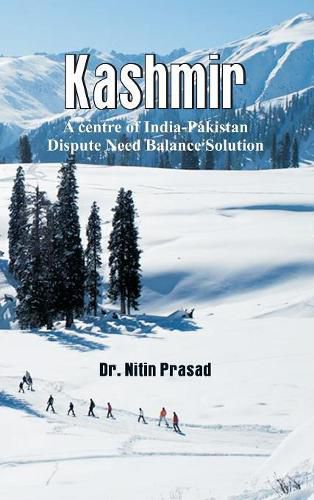Readings Newsletter
Become a Readings Member to make your shopping experience even easier.
Sign in or sign up for free!
You’re not far away from qualifying for FREE standard shipping within Australia
You’ve qualified for FREE standard shipping within Australia
The cart is loading…






This title is printed to order. This book may have been self-published. If so, we cannot guarantee the quality of the content. In the main most books will have gone through the editing process however some may not. We therefore suggest that you be aware of this before ordering this book. If in doubt check either the author or publisher’s details as we are unable to accept any returns unless they are faulty. Please contact us if you have any questions.
The Kashmir dispute dates from 1947. The partition of the Indian sub-continent along religious lines led to the formation of India and Pakistan. However, there remained the problem of over 650 states, run by princes, existing within the two newly independent countries. The Line of Control (LOC) between India and Pakistan is perhaps the most dangerous place in the world. Both India and Pakistan have their own political reasons for continuing the fighting. Although the ruler of Jammu and Kashmir, Hari Singh, was an Indian, most of his subjects were Muslims. War was averted when India and Pakistan agreed to a plebiscite to decide the fate of Kashmir. There were delays in implementing this decision, however, and increasingly it became clear that the Indians wanted to keep that portion which contained Jamu and Kashmir. Despite numerous United Nations resolutions the dispute remained unsettled. Pakistan argued that Kashmir should become a part of Pakistan because the majority of its inhabitants were Muslims. The Indians claimed, without proof, that Kashmiris wanted to remain a part of India. In 1972 Indira Gandhi, the Indian prime minister, and Zulfikar Ali Bhutto, her Pakistani opposite number (and father of Benazir Bhutto, a later Pakistani premier), signed the Simla Agreement, which reiterated the promises made in Tashkent. The two sides once again agreed to resolve the issue peacefully, as domestic issues dominated. Both India and Pakistan had other important domestic problems which kept Kashmir on the back-burner. In a diverse country like India, disaffection and discontent are not uncommon. Indian democracy has the necessary resilience to accommodate genuine grievances within the framework of our sovereignty, unity and integrity. Government of India has expressed its willingness to accommodate the legitimate political demands of the people of the state of J&K. However, Pakistan sponsored terrorists have terrorised the population and hindered political dialogue by intimidating or silencing voices of moderation that wish to engage in dialogue. The human rights of the people of J&K have been systematically violated by such terror tactics and the kidnappings and killings of innocent people by terrorists. Every effort has been taken to make this book useful for students of conflict resolution scholars and general readers.
$9.00 standard shipping within Australia
FREE standard shipping within Australia for orders over $100.00
Express & International shipping calculated at checkout
This title is printed to order. This book may have been self-published. If so, we cannot guarantee the quality of the content. In the main most books will have gone through the editing process however some may not. We therefore suggest that you be aware of this before ordering this book. If in doubt check either the author or publisher’s details as we are unable to accept any returns unless they are faulty. Please contact us if you have any questions.
The Kashmir dispute dates from 1947. The partition of the Indian sub-continent along religious lines led to the formation of India and Pakistan. However, there remained the problem of over 650 states, run by princes, existing within the two newly independent countries. The Line of Control (LOC) between India and Pakistan is perhaps the most dangerous place in the world. Both India and Pakistan have their own political reasons for continuing the fighting. Although the ruler of Jammu and Kashmir, Hari Singh, was an Indian, most of his subjects were Muslims. War was averted when India and Pakistan agreed to a plebiscite to decide the fate of Kashmir. There were delays in implementing this decision, however, and increasingly it became clear that the Indians wanted to keep that portion which contained Jamu and Kashmir. Despite numerous United Nations resolutions the dispute remained unsettled. Pakistan argued that Kashmir should become a part of Pakistan because the majority of its inhabitants were Muslims. The Indians claimed, without proof, that Kashmiris wanted to remain a part of India. In 1972 Indira Gandhi, the Indian prime minister, and Zulfikar Ali Bhutto, her Pakistani opposite number (and father of Benazir Bhutto, a later Pakistani premier), signed the Simla Agreement, which reiterated the promises made in Tashkent. The two sides once again agreed to resolve the issue peacefully, as domestic issues dominated. Both India and Pakistan had other important domestic problems which kept Kashmir on the back-burner. In a diverse country like India, disaffection and discontent are not uncommon. Indian democracy has the necessary resilience to accommodate genuine grievances within the framework of our sovereignty, unity and integrity. Government of India has expressed its willingness to accommodate the legitimate political demands of the people of the state of J&K. However, Pakistan sponsored terrorists have terrorised the population and hindered political dialogue by intimidating or silencing voices of moderation that wish to engage in dialogue. The human rights of the people of J&K have been systematically violated by such terror tactics and the kidnappings and killings of innocent people by terrorists. Every effort has been taken to make this book useful for students of conflict resolution scholars and general readers.